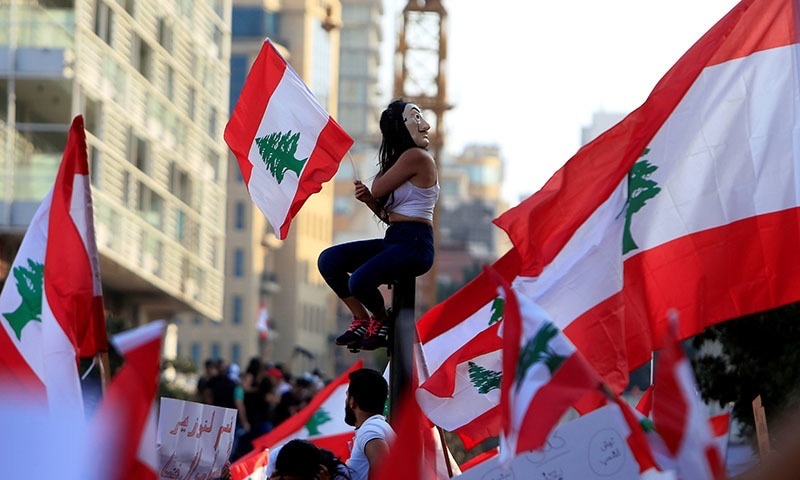On the fifth day of a series of massive protests in Lebanon, workers from the country’s largest unions have joined over a million protesters in the streets, calling for the ouster of the country’s government. The nation’s banks and numerous businesses have been shut down since last week. Schools and universities remain closed as thousands of teachers and students participate in the demonstrations. In a statement on the strike, Lebanon’s teachers union called the protests “a social revolution.” With no end to the protests in sight, the official entry of the labor organizations into the fight marks a significant shift in Lebanon’s week-long uprising.
Hundreds of thousands of people initially flocked to the streets of Beirut on October 17 after the government announced a tax on WhatsApp calls, along with other tax hikes. The WhatsApp tax in particular targeted working-class people who cannot afford the national telecommunications company’s regular rates—some of the highest in the world—and rely on WhatsApp to communicate with family members living abroad. This latest attack by Lebanon’s ruling class would put additional economic pressure on workers already suffering the effects of Lebanon’s immense public debt and economic crisis.
Outraged, protesters responded by occupying buildings and public spaces across Beirut. They stormed the abandoned Grand Theater, a monument from the time before Lebanon’s devastating civil war, and occupied Riad al-Solh Square in the heart of the city. Other protesters set up barricades and blocked four of the city’s main highways. Hundreds of thousands of people marched to gather in front of the parliament building where they confronted the military police, who responded with tear gas and severe repression.
President Saad Hariri quickly repealed the taxes in response to the mobilizations, but the protesters are pushing further. They demand a solution to Lebanon’s economic crisis that places the burden of the situation where it belongs—on the backs of the ruling class. Realizing that the government is completely unable to organize such a solution, however, protesters are calling for a complete overhaul of the government. As early as Friday morning, protesters in Beirut began chanting “revolution!” and “the people demand the fall of the regime” (the same slogan used during the Arab Spring in 2011) as they demonstrated in public spaces across the city. Four officials resigned Sunday in reaction to the mobilizations. Facing outright rebellion in the streets and upheaval in parliament, Hariri set a 72-hour deadline on Friday night for the government to come up with a solution to reduce Lebanon’s debt.
Over the weekend, the protests spread beyond the capital city to Lebanon’s second-biggest city, Tripoli, as well to the southern port Tyre and several other cities. Protesters set up roadblocks and barricades, confronting the police and shutting down operations across the country.
Ciudades del Líbano sepultadas por el humo tras una noche de protestas multitudinarias https://t.co/4yDDl6cVGE pic.twitter.com/08OJI4ioap
— RT en Español (@ActualidadRT) October 18, 2019
The Ruling Class Cannot Resolve the Crisis
On Monday, the country’s cabinet convened a five-hour emergency meeting to develop new measures to make a dent in Lebanon’s debt of $86 billion, which represents more than 150% of the country’s gross domestic product and is the third highest public debt in the world. Hariri is aiming to drastically reduce the debt next year in order to obtain $11 billion in international aid from imperialist interests around the world.
He announced later in the day that his cabinet had agreed on a sweeping series of reforms for 2020 that would cut spending without raising taxes. Remarkably, the reform package includes several measures that weaken the government and defy capitalist interests, including halving the salaries of government officials, abolishing the Ministry of Information, and taxing bank profits.
These reforms show that Lebanon’s ruling class is terrified by similar scenes of unrest in countries like Ecuador, Haiti, and Chile, and so they are willing to make significant concessions to the protesters in order to regain control. Despite his claims to the contrary, Hariri knows that his government rests on shaky ground. As he said in his announcement of the new policies:
The decisions that we made today might not fulfil your goals but for sure it achieves what I have been seeking for two years… These decisions are not a trade. I am not going to ask you to stop protesting and stop expressing your anger. This is a decision that you take. Frankly speaking, your protest is what made us take these decisions that you witnessed today… what you did has broken all barriers and shook all political parties.
But the working people and students in the streets are not satisfied by this retreat. Far from subsiding, the protests and the general strike have continued to grow since Hariri’s announcement. The people know that the reform package will only prolong Lebanon’s economic crisis.
The government’s proposal includes measures that will go a long way to opening Lebanon to pernicious foreign capital and further austerity measures down the road. The package includes policies that weaken the ruling class to some extent, but it also includes measures that will begin the process of privatizing Lebanon’s national industries in an effort to curb corruption. It also institutes policies specifically designed to attract foreign aid and investment, which will make Lebanon further dependent on foreign capital.
Rejecting the reform package, which is set to pass the cabinet late Monday night, protesters are continuing to demand the resignation of the government. Now they have added a call for a council of “politically-unaligned” judges to handle the country’s affairs until new elections can be held.
In light of the recent uptick in class struggle across the globe, the Lebanese ruling class is offering unprecedented concessions to the masses demonstrating in the streets. As Hariri himself admitted, whether the uprising continues and how far it goes can only be decided by the protesters themselves. One thing is certain: If the protests are to truly bring about the demise of the government, the continued participation of the labor movement, linked with the student and other social movements, is indispensable.











